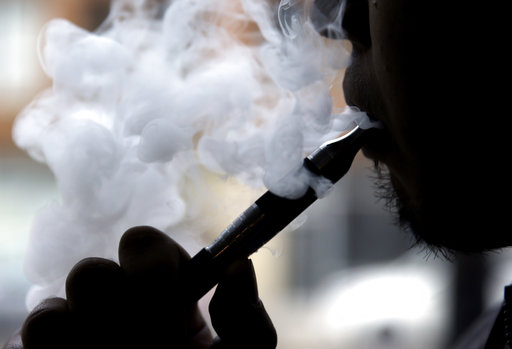School Juuls: NT responds to national vaping epidemic
Youth Risk Behavior Survey shows sharp increase in e-cigarette usage

ASSOCIATED PRESS
Student e-cigarette usage has doubled since the last YRBS survey, according to Feb. 2018 questionnaire | AP Images
The response of the FDA to the sudden spike in e-cigarette use has sparked a disciplinary response by adminstrators, increasing the consequences of Juuling in school.
Sophomore Boys Adviser Chair,Ted Koulentes, said “In conversations with students, they didn’t always know what they were getting themselves into: a lifelong journey they were about to embark on related to nicotine.”
Junior Tenzin Jamyang said students vape because, “They don’t realize the effects on their future life. Some kids don’t even know that a Juul has nicotine in it. Also, especially in this area, those devices are easily attainable.”
While the government has recently focused on cigarette smoking as a public health problem, the FDA said that teens’ use of e-cigarettes “Has reached an ‘epidemic proportion,’” as research shows more and more of the negative effects, according the New York Times. The FDA’s research involves the legality of marketing nicotine products to teenagers.
The FDA stated that if “Major manufacturers fail to halt sales to minors, the agency could remove their flavored products from the market,” threatening criminal charges to those selling products in bulk online. The agency also sent warning letters to retailers such as Walgreens and 7-Eleven that have been breaking the federal law by selling e-cigarettes to kids under 18.
Several students, however, said that their access to Juuls is not limited to stores and gas stations nearby.
“If they stopped selling them, it would not decrease the amount of Juuling at school. If someone really wants to do something, they will figure out a way to do it”, said one senior
An anonymous senior said she thinks one reason students Juul is, “Because the school hates it so much. I feel like a lot of students just do it out of spite. School says we can’t do it? Let’s do it.”
Koulentes said, “It’s a bigger problem than we’d like to admit. We saw those numbers jump really quickly,” referencing the statistics from the Youth Risk Behavior Survey (YRBS) from the CDC.
The spike in the use of e-cigarettes more than doubled from the last survey, according to the Feb. 2018 survey which collected the responses of 3209 students.
This is a major spike given that a 5% increase in marijuana use since last year was considered alarming.
Assistant Superintendent for Student Services, Timothy Hayes, who analyzed the survey data, mentioned that “Perception is higher than actual use, and if kids believe everyone’s doing it, they are more likely to.”
Police Liason Josue Perez explained, “The less other kids perceive it as a normal thing, the less likely they are to get involved in it. The temptation is there, but we don’t want it to be at school.”
The administration is doing everything it can to help students make good choices by preventing them from using e-cigarrettes, said Assistant Principal for Student Services, Scott Williams.
The consequences have heightened as the administration prioritizes preventing harmful habits in school, “A safe place that is supposed to be a learning environment,” said Perez.
If students are caught with e-cigarettes in school, a citation can be issued at the discretion of the officer, and it is treated differently at each campus because of the way each village enforces ordinances.
Perez said, “I didn’t get involved, now I do. The problem has been increasing, so we’ve gotten more serious about the consequences.”
This change is meant to encourage education so that “Young people can be better trained to deal with the temptation,” said Perez.
The discipline model is a growth model, as Williams explained, “If you make a bad choice, we give you the opportunity to reflect and learn from the situation. We don’t just give a consequence.”
Williams added, however, “The school doesn’t protect students from the law, which is not a shift at all compared with substance violations.”
Perez explained that possession of e-cigarettes or nicotine, like alcohol and other paraphernalia, is a status offense — it’s only illegal for juveniles.
“It’s early in the year,” Koulentes said, “but in my office I have not had any violations yet.”






































